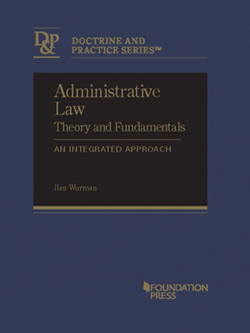- Home
- Administrative Law Theory and Fundamentals: An Integrated Approach
Administrative Law Theory and Fundamentals: An Integrated Approach
Administrative Law Theory and Fundamentals: An Integrated Approach takes a formalist approach to administrative law while defending more of the administrative state than other formalist accounts. It proposes a theory of administrative power that better explains constitutional text and structure, as well as historical and modern practice. It argues that there are “exclusive” powers that only Congress, the President, and the courts can respectively exercise, but also “nonexclusive” powers that can be exercised by more than one branch. This theory of “nonexclusive powers” allows students and scholars of administrative law to make more sense of—or better critiques of—administrative concepts such as delegation, quasi-powers, judicial deference, agency adjudications, the chameleon-like quality of government power, and of the separation of powers more broadly.
The casebook also innovates by more extensively discussing (and including in appendices) the 1852 steamboat legislation and the 1887 Interstate Commerce Act; deploying lessons of statutory interpretation as they arise in specific cases; interspersing online assessment questions for each chapter; and by including dedicated “debating” sections that excerpt from the secondary literature on the theory, values, and policy merits of contested doctrines such as deference, unitary executive power, the due process revolution, and universal injunctions. Finally, the book makes numerous organizational improvements, including by placing due process materials after Article III materials and restructuring materials on reviewability.
This title utilizes the CasebookPlus™ platform. Anchored by faculty-authored formative self-assessments, CasebookPlus allows students to test their understanding of core concepts as they are learning them in class with quizzes keyed to each chapter, subject area review quizzes, and helpful explanations. Learn more at
Faculty-CasebookPlus.com.
Imprint: Foundation Press
Series: Doctrine and Practice Series
Publication Date: 05/13/2021
Related Subject(s): Professional Identity Formation
Ilan Wurman, Arizona State University College of Law
CasebookPlus™
This title is available in our CasebookPlus format. CasebookPlus provides support beyond your classroom lectures and materials by offering additional digital resources to you and your students. Anchored by faculty-authored formative self-assessments keyed to our most popular casebooks, CasebookPlus allows students to test their understanding of core concepts as they are learning them in class – on their own, outside of the classroom, with no extra work on your part. CasebookPlus combines three important elements:
- A new print or digital casebook
- Access to a downloadable eBook with the ability to highlight and add notes
- 12-month access to a digital Learning Library complete with:
- Chapter questions keyed to the casebook
- Black Letter Law questions (available in select subjects)
- Subject area review questions for end of semester use
Leading digital study aids, an outline starter, and audio lectures in select subjects
Students can still utilize CasebookPlus digital resources if they’ve purchased a used book or are renting their text by purchasing the Learning Library at westacademic.com.
With CasebookPlus, you can customize your students’ learning experience and monitor their performance. The quiz editor allows you to create your own custom quiz set, suppress specific quiz questions or quiz sets, and time-release quiz questions. Additionally, the flexible, customized reporting capability helps you evaluate your students’ understanding of the material and can also help your school demonstrate compliance with the new ABA Assessment and Learning Outcomes standards.
Learn more about this series.
Access Denied
Law School Faculty - Sign in or Create an Account to access this content. Law faculty who have created an account can sign in after receiving email notification that registration has been approved. Email accountmanager@westacademic.com or call 800-313-9378 for assistance.
Other Higher Education Faculty who wish to access digital review copies or teaching resources should contact their West Academic Account Manager at college@westacademic.com or 800-360-9378.
Adopters Only
This content is intended for adopters only. Sign in or Create an Account to access this content. Law faculty who have created an account can sign in after receiving email notification that registration has been approved. If you are an adopter who is unable to access this content after signing in, contact your account manager for assistance at accountmanager@westacademic.com or call 800-313-9378 for assistance.
Access Denied
Sign in or Create an Account to access this content. Faculty who have created an account can sign in after receiving email notification that registration has been approved. Contact us for assistance.
Law School Faculty: email accountmanager@westacademic.com or call 800-313-9378.
Other Higher Education Faculty: email college@westacademic.com or 800-360-9378.
Access Denied
Higher education faculty who wish to view this document should contact their West Academic Account Manager at college@westacademic.com or 800-360-9378.
